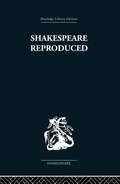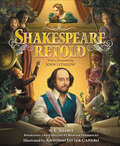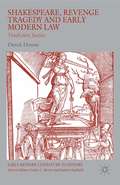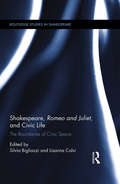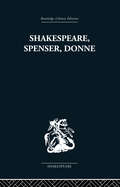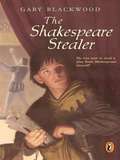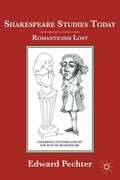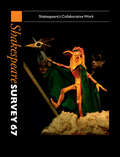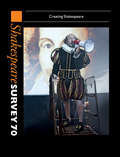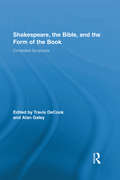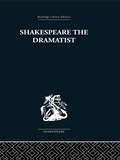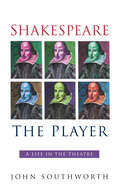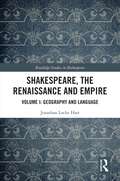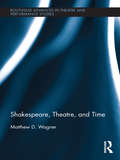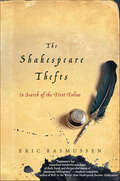- Table View
- List View
Shakespeare Performance Studies
by W. B. WorthenTaking a 'performance studies' perspective on Shakespearean theatre, W. B. Worthen argues that the theatrical event represents less an inquiry into the presumed meanings of the text than an effort to frame performance as a vehicle of cultural critique. Using contemporary performances as test cases, Worthen explores the interfaces between the origins of Shakespeare's writing as literature and as theatre, the modes of engagement with Shakespeare's plays for readers and spectators, and the function of changing performance technologies on our knowledge of Shakespeare. This book not only provides the material for performance analysis, but places important contemporary Shakespeare productions in dialogue with three influential areas of critical discourse: texts and authorship, the function of character in cognitive theatre studies, and the representation of theatre and performing in the digital humanities. This book will be vital reading for scholars and advanced students of Shakespeare and of Performance Studies.
Shakespeare Reproduced: The text in history and ideology
by Jean E Howard Marion F O’ConnorFirst published in 1987. The essays in Shakespeare Reproduced offer a political critique of Shakespeare's writings and the uses to which those writings are put Some of the essays focus on Shakespeare in his own time and consider how his plays can be seen to reproduce or subvert the cultural orthodoxies and the power relations of the late Renaissance. Others examine the forces which have produced an overtly political criticism of Shakespeare and of his use in culture. Contributors include: Jean E Howard and Marion O'Connor, Walter Cohen, Don E Wayne, Thomas Cartelli, Peter Erickson, Karen Newman, Thomas Moisan, Michael D Bristol, Thomas Sorge, Jonathan Goldberg, Robert Weimann, Margaret Ferguson.
Shakespeare Retold
by E. NesbitA beautifully illustrated collection of prose retellings of seven Shakespeare plays will bring the Bard to life for young readers. Not only is this a beautiful keepsake edition, full of gorgeous illustrations by Antonio Javier Caparo, but the prose retellings by beloved classic children’s book author E. Nesbit are an excellent tool to introduce children to the complex language of Shakespeare.A foreword by John Lithgow touches on his own childhood as a Shakespearean actor and the importance of Shakespeare. The book contains extensive support materials, including a biography, a timeline of Shakespeare’s life, and further recommended readings.In this volume, you will find:Romeo and JulietA Midsummer Night’s DreamTwelfth NightHamletMacbethThe TempestMuch Ado About Nothing
Shakespeare, Revenge Tragedy and Early Modern Law: Vindictive Justice (Early Modern Literature in History)
by Derek DunneThis book, the first to trace revenge tragedy's evolving dialogue with early modern law, draws on changing laws of evidence, food riots, piracy, and debates over royal prerogative. By taking the genre's legal potential seriously, it opens up the radical critique embedded in the revenge tragedies of Kyd, Shakespeare, Marston, Chettle and Middleton.
Shakespeare, Rhetoric and Cognition
by Raphael LyneRaphael Lyne addresses a crucial Shakespearean question: why do characters in the grip of emotional crises deliver such extraordinarily beautiful and ambitious speeches? How do they manage to be so inventive when they are perplexed? Their dense, complex, articulate speeches at intensely dramatic moments are often seen as psychological - they uncover and investigate inwardness, character and motivation - and as rhetorical - they involve heightened language, deploying recognisable techniques. Focusing on A Midsummer Night's Dream, Othello, Cymbeline and the Sonnets, Lyne explores both the psychological and rhetorical elements of Shakespeare's language. In the light of cognitive linguistics and cognitive literary theory he shows how Renaissance rhetoric could be considered a kind of cognitive science, an attempt to map out the patterns of thinking. His study reveals how Shakespeare's metaphors and similes work to think, interpret and resolve, and how their struggle to do so results in extraordinary poetry.
Shakespeare, Romeo and Juliet, and Civic Life: The Boundaries of Civic Space (Routledge Studies in Shakespeare)
by Silvia Bigliazzi Lisanna CalviThis volume introduces ‘civic Shakespeare’ as a new and complex category entailing the dynamic relation between the individual and the community on issues of authority, liberty, and cultural production. It investigates civic Shakespeare through Romeo and Juliet as a case study for an interrogation of the limits and possibilities of theatre and the idea of the civic. The play’s focus on civil strife, political challenge, and the rise of a new conception of the individual within society makes it an ideal site to examine how early modern civic topics were received and reconfigured on stage, and how the play has triggered ever new interpretations and civic performances over time. The essays focus on the way the play reflects civic life through the dramatization of issues of crisis and reconciliation when private and public spaces are brought to conflict, but also concentrate on the way the play has subsequently entered the public space of civic life. Set within the fertile context of performance studies and inspired by philosophical and sociological approaches, this book helps clarify the role of theatre within civic space while questioning the relation between citizens as spectators and the community. The wide-ranging chapters cover problems of civil interaction and their onstage representation, dealing with urban and household spaces; the boundaries of social relations and legal, economic, political, and religious regulation; and the public dimension of memory and celebration. This volume articulates civic Romeo and Juliet from the sources of genre to contemporary multicultural performances in political contact-zones and civic ‘Shakespaces,’ exploring the Bard and this play within the context of communal practices and their relations with institutions and civic interests.
Shakespeare, Spenser, Donne: Renaissance Essays
by Frank KermodeFirst published in 1971. This collection of essays discusses some of the central works and areas of literature in the Renaissance period of cultural history. Contents include: Spenser and the Allegorists; The Faerie Queene, I and V; The Cave of Mammon; The Banquet of Sense; John Donne; The Patience of Shakespeare; Survival fo the Classic; Shakespeare's Learning; The Mature Comedies; The Final Plays.
The Shakespeare Stealer
by Gary BlackwoodWidge is an orphan with a rare talent for shorthand. His fearsome master has just one demand: steal Shakespeare's play "Hamlet"--or else. Widge has no choice but to follow orders, so he works his way into the heart of the Globe Theatre, where Shakespeare's players perform. As full of twists and turns as a London alleyway, this entertaining novel is rich in period details, colorful characters, villainy, and drama."A fast-moving historical novel that introduces an important era with casual familiarity." --School Library Journal, starred review
The Shakespeare Stealer
by Gary BlackwoodFourteen year-old Widge has very little going for him, no family, no real name, but he can write shorthand and that is a very valuable asset to the man who wants to steal William Shakespeare's play Hamlet. In those days there was only one copy of the play script, and that was jealously guarded at the Globe Theatre, London by Shakespeare's company of players. Widge sets off for London, accompanied by Falconer, a cruel and fearsome cutthroat whose job is to make sure that the mission is accomplished, no matter what the cost. But Widge gets so caught up in the play that soon all that matters to him is whether Hamlet will take action to avenge his father, and he forgets his task. Then his notebook is stolen. Under threat from Falconer, he manages to work his way into the troupe of actors, who befriend him and, for the first time, make him feel part of a family. How can he betray them now?
The Shakespeare Stealer
by Gary L. BlackwoodWidge is an orphan with a rare talent for shorthand. His fearsome master has just one demand: steal Shakespeare's play "Hamlet"--or else. Widge has no choice but to follow orders, so he works his way into the heart of the Globe Theatre, where Shakespeare's players perform. As full of twists and turns as a London alleyway, this entertaining novel is rich in period details, colorful characters, villainy, and drama.
Shakespeare Studies Today
by Edward PechterThe Romantics invented Shakespeare studies, and in losing contact with our origins, we have not been able to develop an adequate alternative foundation on which to build our work. This book asserts that among Shakespeareans at present, the level of conviction required to sustain a healthy critical practice is problematically if not dangerously low, and the qualities which the Romantics valued in an engagement with Shakespeare are either ignored these days or fundamentally misunderstood.
Shakespeare Survey: Volume 62, Close Encounters with Shakespeare's Text
by Peter HollandShakespeare Survey is a yearbook of Shakespeare studies and production. Since 1948 Survey has published the best international scholarship in English and many of its essays have become classics of Shakespeare criticism. Each volume is devoted to a theme, or play, or group of plays; each also contains a section of reviews of the previous year's textual and critical studies and of major British performances. The books are illustrated with a variety of Shakespearean images and production photographs. The current editor of Survey is Peter Holland. The first eighteen volumes were edited by Allardyce Nicoll, numbers 19-33 by Kenneth Muir and numbers 34-52 by Stanley Wells. The virtues of accessible scholarship and a keen interest in performance, from Shakespeare's time to our own, have characterized the journal from the start. For the first time, numbers 1-50 are being reissued in paperback, available separately and as a set.<P> The theme for volume 62 is 'Close Encounters with Shakespeare's Text'. The complete set of Survey volumes is also available online at http://www.cambridge.org/online/shakespearesurvey. This fully-searchable resource enables users to browse by author, essay and volume, search by play, theme and topic, and save and bookmark their results.
Shakespeare Survey: Volume 64, Shakespeare as Cultural Catalyst
by Peter HollandShakespeare Survey is a yearbook of Shakespeare studies and production. Since 1948 Survey has published the best international scholarship in English and many of its essays have become classics of Shakespeare criticism. Each volume is devoted to a theme, or play, or group of plays; each also contains a section of reviews of the previous year's textual and critical studies and of major British performances. The books are illustrated with a variety of Shakespearean images and production photographs. The current editor of Survey is Peter Holland. The first eighteen volumes were edited by Allardyce Nicoll, numbers 19-33 by Kenneth Muir and numbers 34-52 by Stanley Wells. The virtues of accessible scholarship and a keen interest in performance, from Shakespeare's time to our own, have characterized the journal from the start. For the first time, numbers 1-50 are being reissued in paperback, available separately and as a set.<P> The theme for volume 64 is 'Shakespeare as Cultural Catalyst'. The complete set of Survey volumes is also available online at http://www.cambridge.org/online/shakespearesurvey. This fully-searchable resource enables users to browse by author, essay and volume, search by play, theme and topic, and save and bookmark their results.
Shakespeare Survey: Volume 65, A Midsummer Night's Dream
by Peter HollandShakespeare Survey is a yearbook of Shakespeare studies and production. Since 1948 Survey has published the best international scholarship in English and many of its essays have become classics of Shakespeare criticism. Each volume is devoted to a theme, or play, or group of plays; each also contains a section of reviews of the previous year's textual and critical studies and of major British performances. The books are illustrated with a variety of Shakespearean images and production photographs. The current editor of Survey is Peter Holland. The first eighteen volumes were edited by Allardyce Nicoll, numbers 19-33 by Kenneth Muir and numbers 34-52 by Stanley Wells. The virtues of accessible scholarship and a keen interest in performance, from Shakespeare's time to our own, have characterized the journal from the start. For the first time, numbers 1-50 are being reissued in paperback, available separately and as a set.<P> The theme for Volume 65 is 'A Midsummer Night's Dream'. The complete set of Survey volumes is also available online at http://www.cambridge.org/online/shakespearesurvey. This fully searchable resource enables users to browse by author, essay and volume, search by play, theme and topic and save and bookmark their results.
Shakespeare Survey: Volume 66, Working with Shakespeare
by Peter HollandShakespeare Survey is a yearbook of Shakespeare studies and production. Since 1948 Survey has published the best international scholarship in English and many of its essays have become classics of Shakespeare criticism. Each volume is devoted to a theme, or play, or group of plays; each also contains a section of reviews of the previous year's textual and critical studies and of major British performances. The books are illustrated with a variety of Shakespearean images and production photographs. The current editor of Survey is Peter Holland. The first eighteen volumes were edited by Allardyce Nicoll, numbers 19-33 by Kenneth Muir and numbers 34-52 by Stanley Wells. The virtues of accessible scholarship and a keen interest in performance, from Shakespeare's time to our own, have characterized the journal from the start. For the first time, numbers 1-50 are being reissued in paperback, available separately and as a set. <P> The theme for Volume 66 is 'Working with Shakespeare', and Tiffany Stern's essay has been selected by the Medieval and Renaissance Drama Society for its Barbara Palmer/Martin Stevens award for best new essay in early drama studies, 2014. The complete set of Survey volumes is also available online at http://www.cambridge.org/online/shakespearesurvey. This fully searchable resource enables users to browse by author, essay and volume, search by play, theme and topic and save and bookmark their results.
Shakespeare Survey: Volume 67, Shakespeare's Collaborative Work
by Peter Holland Ton HoenselaarsShakespeare Survey is a yearbook of Shakespeare studies and production. Since 1948 Survey has published the best international scholarship in English and many of its essays have become classics of Shakespeare criticism. Each volume is devoted to a theme, or play, or group of plays; each also contains a section of reviews of the previous year's textual and critical studies and of major British performances. The books are illustrated with a variety of Shakespearean images and production photographs. The current editor of Survey is Peter Holland. The first eighteen volumes were edited by Allardyce Nicoll, numbers 19-33 by Kenneth Muir and numbers 34-52 by Stanley Wells. The virtues of accessible scholarship and a keen interest in performance, from Shakespeare's time to our own, have characterized the journal from the start. For the first time, numbers 1-50 are being reissued in paperback, available separately and as a set.<P> The theme for Volume 67 is 'Shakespeare's Collaborative Work'. The complete set of Survey volumes is also available online at http://www.cambridge.org/online/shakespearesurvey. This fully searchable resource enables users to browse by author, essay and volume, search by play, theme and topic, and save and bookmark their results.
Shakespeare Survey: Shakespeare Survey
by Holland Peter Smith Emma Peter Holland Emma SmithShakespeare Survey is a yearbook of Shakespeare studies and production. Since 1948 Survey has published the best international scholarship in English and many of its essays have become classics of Shakespeare criticism. Each volume is devoted to a theme, or play, or group of plays; each also contains a section of reviews of the previous year's textual and critical studies and of major British performances. The books are illustrated with a variety of Shakespearean images and production photographs. The current editor of Survey is Peter Holland. The first eighteen volumes were edited by Allardyce Nicoll, numbers 19-33 by Kenneth Muir and numbers 34-52 by Stanley Wells. The virtues of accessible scholarship and a keen interest in performance, from Shakespeare's time to our own, have characterised the journal from the start. For the first time, numbers 1-50 are being reissued in paperback, available separately and as a set.
Shakespeare Survey 70: Creating Shakespeare (Shakespeare Survey #70)
by Peter HollandThe seventieth volume in the annual series of volumes devoted to Shakespeare study and production. The articles are drawn from the World Shakespeare Congress, held 400 years after Shakespeare's death, in July/August 2016 in Stratford-upon-Avon and London. The theme is 'Creating Shakespeare'.
Shakespeare, the Bible, and the Form of the Book: Contested Scriptures (Routledge Studies in Shakespeare)
by Alan Galey Travis DeCookWhy do Shakespeare and the English Bible seem to have an inherent relationship with each other? How have these two monumental traditions in the history of the book functioned as mutually reinforcing sources of cultural authority? How do material books and related reading practices serve as specific sites of intersection between these two textual traditions? This collection makes a significant intervention in our understanding of Shakespeare, the Bible, and the role of textual materiality in the construction of cultural authority. Departing from conventional source study, it questions the often naturalized links between the Shakespearean and biblical corpora, examining instead the historically contingent ways these links have been forged. The volume brings together leading scholars in Shakespeare, book history, and the Bible as literature, whose essays converge on the question of Scripture as source versus Scripture as process—whether that scripture is biblical or Shakespearean—and in turn explore themes such as cultural authority, pedagogy, secularism, textual scholarship, and the materiality of texts. Covering an historical span from Shakespeare’s post-Reformation era to present-day Northern Ireland, the volume uncovers how Shakespeare and the Bible’s intertwined histories illuminate the enduring tensions between materiality and transcendence in the history of the book.
Shakespeare the Dramatist: And other papers
by Una Ellis-FermorFirst published in 1961. On her death, Professor Ellis-Fermor left behind some uncollected essays and part of a book on Shakespeare the Dramatist. This volume includes the chapters of the unfinished work and three further articles on Shakespeare. It discusses Shakespeare's methods with regard to plot, character, diction, and imagery and it contains comparative analysis of Shakespeare with other dramatists, including Ibsen and Corneille.
Shakespeare the Player: A Life in the Theatre
by John SouthworthTo his contemporaries, Shakespeare was known as an actor, not a playwright, yet this fact has been largely ignored. This title overturns traditional images of the Bard, arguing that Shakespeare cannot be separated from his profession as a player any more than he can be separated from his works.
Shakespeare, the Queen'S Men, and the Elizabethan Performance of History
by Brian WalshThe Elizabethan history play was one of the most prevalent dramatic genres of the 1590s, and so was a major contribution to Elizabethan historical culture. The genre has been well served by critical studies that emphasize politics and ideology; however, there has been less interest in the way history is interrogated as an idea in these plays. Drawing in period-sensitive ways on the field of contemporary performance theory, Walsh looks at the Shakespearean history play from a fresh angle, by first analyzing the foundational work of the Queen's Men, the playing company that invented the popular history play. Through innovative readings of their plays including The Famous Victories of Henry V before moving on to Shakespeare's 1 Henry VI, Richard III, and Henry V, this book investigates how the Queen's Men's self-consciousness about performance helped to shape Shakespeare's dramatic and historical imagination.
Shakespeare, the Renaissance and Empire: Volume I: Geography and Language (Routledge Studies in Shakespeare #1)
by Jonathan Locke HartShakespeare, the Renaissance and Empire presents Shakespeare as both a local and global writer, investigating Shakespeare’s trans-cultural writing through the interrelations and interactions of binaries including theory and practice, past and present, aesthetics and ethics, freedom and tyranny, republic and empire, empires and colonies, poetry and history, rhetoric and poetics, England and America, and England and Asia. The book breaks away from traditional western-centric analysis to present a universal Shakespeare, exposing readers to the relevance and significance of Shakespeare within their local contexts and cultures. This text aims to present a global Shakespeare, utilizing a dual perspective or dialectical presentation, mainly centred on questions of (1) how Shakespeare can be viewed as both an English writer and a world writer; (2) how language operates across genres and kinds of discourse; and (3) how Shakespeare helps to articulate a poetics of both texts (literature) and contexts (cultures). The book’s originality lies in its articulation of the importance and value of Shakespeare in the emerging landscape of global culture.
Shakespeare, Theatre, and Time (Routledge Advances in Theatre & Performance Studies #20)
by Matthew WagnerThat Shakespeare thematized time thoroughly, almost obsessively, in his plays is well established: time is, among other things, a 'devourer' (Love's Labour's Lost), one who can untie knots (Twelfth Night), or, perhaps most famously, simply ‘out of joint’ (Hamlet). Yet most critical commentary on time and Shakespeare tends to incorporate little focus on time as an essential - if elusive - element of stage praxis. This book aims to fill that gap; Wagner's focus is specifically performative, asking after time as a stage phenomenon rather than a literary theme or poetic metaphor. His primary approach is phenomenological, as the book aims to describe how time operates on Shakespearean stages. Through philosophical, historiographical, dramaturgical, and performative perspectives, Wagner examines the ways in which theatrical activity generates a manifest presence of time, and he demonstrates Shakespeare’s acute awareness and manipulation of this phenomenon. Underpinning these investigations is the argument that theatrical time, and especially Shakespearean time, is rooted in temporal conflict and ‘thickness’ (the heightened sense of the present moment bearing the weight of both the past and the future). Throughout the book, Wagner traces the ways in which time transcends thematic and metaphorical functions, and forms an essential part of Shakespearean stage praxis.
The Shakespeare Thefts: In Search of the First Folios
by Eric RasmussenPart literary detective story, part Shakespearean lore, The Shakespeare Thefts will charm the Bard's many fans.The first edition of Shakespeare's collected works, the First Folio, published in 1623, is one of the most valuable books in the world and has historically proven to be an attractive target for thieves. Of the 160 First Folios listed in a census of 1902, 14 were subsequently stolen-and only two of these were ever recovered. In his efforts to catalog all these precious First Folios, renowned Shakespeare scholar Eric Rasmussen embarked on a riveting journey around the globe, involving run-ins with heavily tattooed criminal street gangs in Tokyo, bizarre visits with eccentric, reclusive billionaires, and intense battles of wills with secretive librarians. He explores the intrigue surrounding the Earl of Pembroke, arguably Shakespeare's boyfriend, to whom the First Folio is dedicated and whose personal copy is still missing. He investigates the uncanny sequence of events in which a wealthy East Coast couple drowned in a boating accident and the next week their First Folio appeared for sale in Kansas. We hear about Folios that were censored, the pages ripped out of them, about a volume that was marked in red paint-or is it blood?-on every page; and of yet another that has a bullet lodged in its pages.

